“Don’t just teach your students how to count. Teach them what counts most.”
‘In spite of the utter failure of academic and professional economists to predict, explain or find solutions to the financial and economic crises sweeping the globalised, marketised world they have created, there is still little challenge to the narrow and one-sided way that economics is taught in our universities. In spite of the fact that economics is about complex human relationships, and is therefore bound to be the subject of debate and disagreement, there is no problem with university courses that only teach the neoclassical pro-market approach.’- Gaian Economics
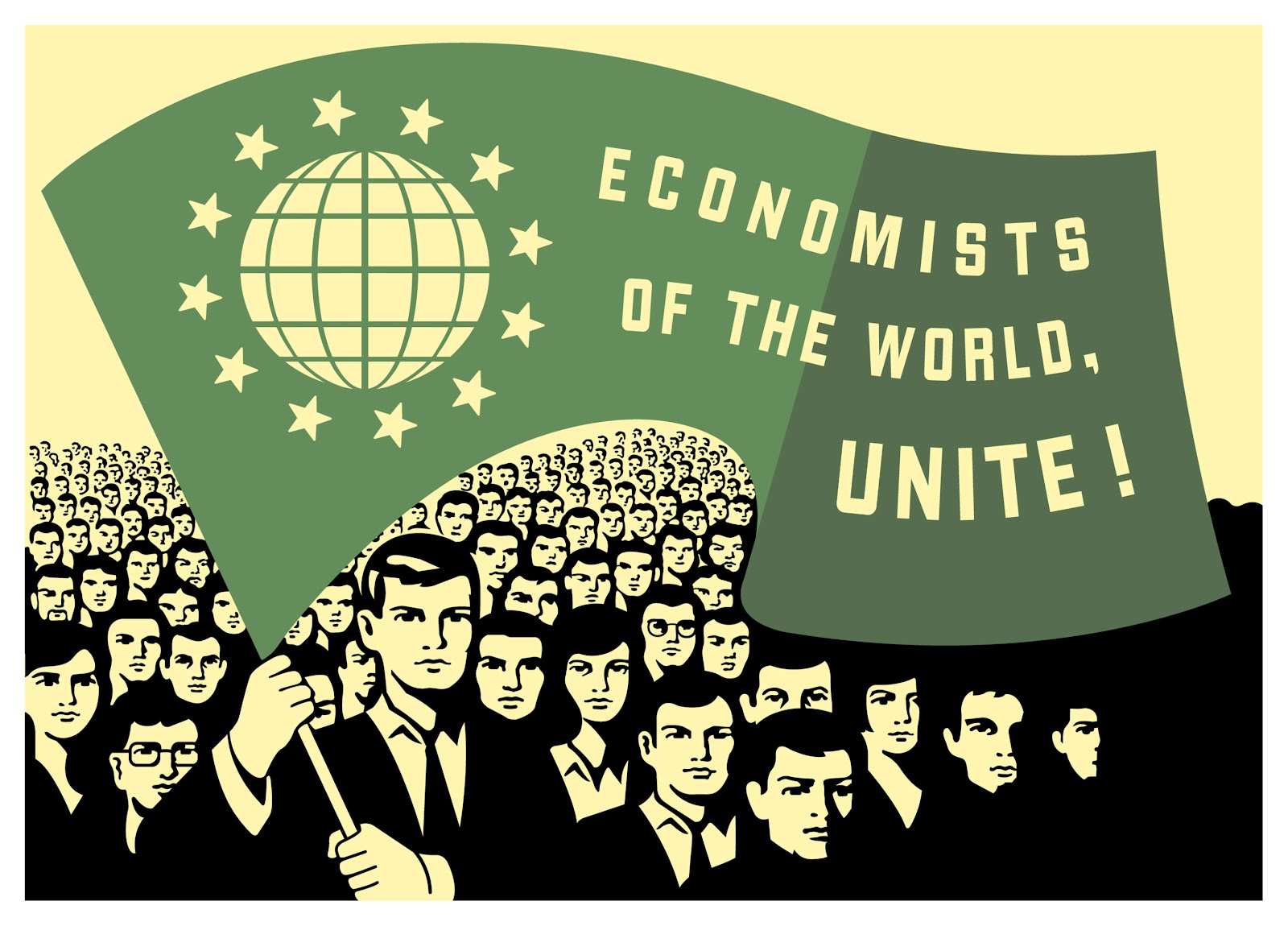
“Economics is only dismal because there are not enough of us making it our own.”
Photo: gaianeconomics.co.uk
ECONOMICS is “not a ‘gay science,” wrote Thomas Carlyle in 1849. No, it is “a dreary, desolate, and indeed quite abject and distressing one; what we might call, by way of eminence, the dismal science.”
But, happily today, some academic economists are discovering that their discipline is not really a “dismal science”, but a subject of beauty, elegance and relevance, if it was to return to its original roots, moral philosophy amid issues and questions of broad significance involving the fullness of human existence.
More economists are now realising that the focus of economics should be on the benefit and the bounty that the economy produces, on how to let this bounty increase, and how to share the benefits justly among the people for the common good, removing the evils that hinder this process. Moreover, they are noticing that economic investigation should be accompanied by research into subjects such as anthropology, psychology, philosophy, politics, ethics and spirituality, to give insight into our own mystery, as no economic theory or no economist can say who we are, where have we come from or where we are going. Humankind must be respected as the centre of creation and not relegated by more short term economic interests.
My question to my fellow academic economists is: Are you one of those "Recovering" economists, and if not, why not?
Students everywhere are calling for pluralism in economics. See below:
So what is economics? What has gone wrong? What is to be done?

Photo: thestash.co
2000- France, the Sorbonne and other universities
“In the spring of 2000 an interesting dichotomy between theory and reality in economics teaching appeared in France when economics students from some of the most prestigious universities, including the Sorbonne, published a petition on the internet urging fellow students to protest against the way economics was being taught. They were against the domination of rationalist theories, the marginalization of critical and reflective thought and the use of increasingly complex mathematical models. Some argued that the drive to make economics more like physics was flawed and that it should be wrenched back in line with its more social aspects”:
In Praise of the Economic Students at the Sorbonne: The Class of 2000
2008- London, Her Majesty Queen Elizabeth II asking the economists at London School of Economics: “Why did nobody notice?”
Your Majesty,
“I note, with much interest, Your Majesty’s recent visit to the London School of Economics. Given the current financial calamity, Your Majesty asked a very pertinent and important question: “Why did nobody notice?”
I firmly believe that the director of research and his colleagues present there, should have provided Your Majesty with truthful and honest answers. However, given what I have read in the press, I do not believe this was the case. Their failure to do so, clearly goes a long way to prove the detachment of economists and the modern neo-liberal economics from the real world. They have turned our profession and subject into a comedy of errors, a dismal science of irrelevance.
This is very sad indeed Your Majesty. An entire profession now appears to have suffered a collapse. Trust and confidence in my profession has all but been demolished, the “dismal science” at its worst.
Many mistakes have been made. Many economists have compromised themselves and their profession by remaining silent, not criticising the extremism and the neo-liberal fundamentalism present in their profession. Lessons should be learnt, someone should be held accountable. Otherwise the same mistakes will be repeated and nobody will believe what an economist says again. In other words, Your Majesty deserves a proper and honest answer…”
2011- London- “There is no correlation between ethics and economics”- Lord Kalms’ letter to the Times (08/03/2011):
Ethics boys
Sir, Around 1991 I offered the London School of Economics a grant of £1 million to set up a Chair in Business Ethics. John Ashworth, at that time the Director of the LSE, encouraged the idea but had to write to me to say, regretfully, that the faculty had rejected the offer as it saw no correlation between ethics and economics. Quite. Lord Kalms, House of Lords
Economics, Globalisation and the Common Good: A Lecture at LondonSchool of Economics
2011- USA, Harvard University, Students of economics revolting against their professor at Harvard
“There is a growing student protest movement against orthodox economics that could change the field as we know it.” On 2nd November 2011 at HarvardUniversity, students of Prof. N. Gregory Mankiw walked out of his class.
“Mankiw is the former head of the Council of Economic Advisers for President George W. Bush and an advisor to Republican presidential candidate Mitt Romney. He is also the author of "Principles of Economics," the predominant textbook used in introductory economics classes worldwide. Not surprisingly, he has an extremely traditional, market-oriented view of the discipline.
The students who walked out of Mankiw's class explained their reasoning in an open letter printed in the Harvard Political Review. It began with this declaration: "Today, we are walking out of your class, Economics 10, in order to express our discontent with the bias inherent in this introductory economics course. We are deeply concerned about the way that this bias affects students, the University, and our greater society.
They went on to explain that instead of presenting a broad introduction to economics, Mankiw's teaching was narrowly focused, did not offer alternative approaches to orthodox economic models and ultimately was complicit in perpetuating systemic global inequality…
These students are frustrated by a field that they believe could provide so much to society but instead is mired in outmoded thinking. Today's economics is dominated by ideas, like the efficient market hypothesis, making such sweeping generalizations that they render human beings practically unrecognizable”…
Goodbye, St Paul's. Hello, St Mary's
2013- Manchester University Economics Students, Post-Crash Economic Society
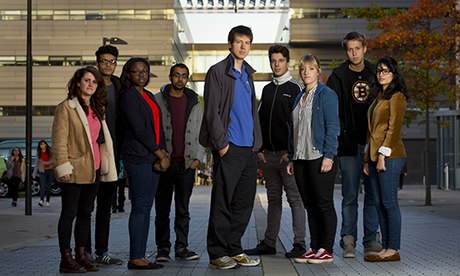
The Post-Crash Economics Society at ManchesterUniversity
Photo: thegusrdian.com
“What wonderfully good news! Once again, another group of brave students of economics at a university have risen against the “dismal science” and the madness of the neo-clasical economics, its ways and its teachings. I am delighted to hear that the Manchester students have seen the light, like their fellow students at other universities, such as the class of 2000 at the Sorbonne”:
2014- International Student Initiative for Pluralism in Economics (ISIPE) was founded

It is not only the world economy that is in crisis. The teaching of economics is in crisis too, and this crisis has consequences far beyond the university walls. What is taught shapes the minds of the next generation of policymakers, and therefore shapes the societies we live in. We, 42 associations of economics students from 19 different countries, believe it is time to reconsider the way economics is taught. We are dissatisfied with the dramatic narrowing of the curriculum that has taken place over the last couple of decades. This lack of intellectual diversity does not only restrain education and research. It limits our ability to contend with the multidimensional challenges of the 21st century – from financial stability, to food security and climate change. The real world should be brought back into the classroom, as well as debate and a pluralism of theories and methods. This will help renew the discipline and ultimately create a space in which solutions to society’s problems can be generated.
United across borders, we call for a change of course. We do not claim to have the perfect answer, but we have no doubt that economics students will profit from exposure to different perspectives and ideas. Pluralism could not only help to fertilize teaching and research and reinvigorate the discipline. Rather, pluralism carries the promise to bring economics back into the service of society. Three forms of pluralism must be at the core of curricula: theoretical, methodological and interdisciplinary.
International Students call for pluralism in economics
GCGI supports the International Student Initiative for Pluralism in Economics
5 May 2014- An international student call for pluralism in economics
“It is not only the world economy that is in crisis.The teaching of economics is in crisis too, and this crisis has consequences far beyond the university walls. What is taught shapes the minds of the next generation of policymakers, and therefore shapes the societies we live in. We, over 65 associations of economics students from over 30 different countries, believe it is time to reconsider the way economics is taught. We are dissatisfied with the dramatic narrowing of the curriculum that has taken place over the last couple of decades. This lack of intellectual diversity does not only restrain education and research. It limits our ability to contend with the multidimensional challenges of the 21st century - from financial stability, to food security and climate change. The real world should be brought back into the classroom, as well as debate and a pluralism of theories and methods. Such change will help renew the discipline and ultimately create a space in which solutions to society’s problems can be generated.
United across borders, we call for a change of course. We do not claim to have the perfect answer, but we have no doubt that economics students will profit from exposure to different perspectives and ideas. Pluralism will not only help to enrich teaching and research and reinvigorate the discipline. More than this, pluralism carries the promise of bringing economics back into the service of society. Three forms of pluralism must be at the core of curricula: theoretical, methodological and interdisciplinary.
Theoretical pluralism emphasizes the need to broaden the range of schools of thought represented in the curricula. It is not the particulars of any economic tradition we object to. Pluralism is not about choosing sides, but about encouraging intellectually rich debate and learning to critically contrast ideas. Where other disciplines embrace diversity and teach competing theories even when they are mutually incompatible, economics is often presented as a unified body of knowledge. Admittedly, the dominant tradition has internal variations. Yet, it is only one way of doing economics and of looking at the real world. Such uniformity is unheard of in other fields; nobody would take seriously a degree program in psychology that focuses only on Freudianism, or a politics program that focuses only on state socialism. An inclusive and comprehensive economics education should promote balanced exposure to a variety of theoretical perspectives, from the commonly taught neoclassically-based approaches to the largely excluded classical, post-Keynesian, institutional, ecological, feminist, Marxist and Austrian traditions - among others. Most economics students graduate without ever encountering such diverse perspectives in the classroom.
Furthermore, it is essential that core curricula include courses that provide context and foster reflexive thinking about economics and its methods per se, including philosophy of economics and the theory of knowledge. Also, because theories cannot be fully understood independently of the historical context in which they were formulated, students should be systematically exposed to the history of economic thought and to the classical literature on economics as well as to economic history. Currently, such courses are either non-existent or marginalized to the fringes of economics curricula.”…
Continue to read the rest of the statement:
Open Letter — International Student Initiative for Pluralism in Economics
I firmly believe that the academic economists should show true leadership, wisdom and humility by supporting their students’ call for pluralism in economics.
“It is clear that some serious reflection is in order. Not to stand back and question what has happened and why, would be to compound failure with failure: failure of vision with failure of responsibility. If nothing else these current crises of finance, social injustice and environmental devastation present us with a unique opportunity to address the shortcomings of our profession with total honesty and humility while returning the “dismal science” to its true position: a subject of beauty, wisdom and virtue.”…
Economics and Economists Engulfed By Crises: What Do We Tell the Students?
Now, the pertinent question is: Are the students being listened to? The short answer is: NO. Dogmatism and conservatism at departments of economics have won again. Academic economists are not prepared to show leadership, humility and wisdom.
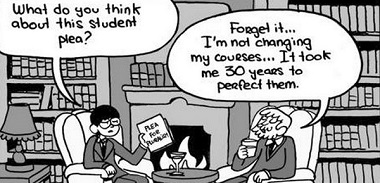
Photo: econintersect.com
As Aditya Chakrabortty writing in the Guardian has noted: “To see how fiercely the academics fight back, take a look at the University of Manchester.”
“Since last autumn, members of the university's Post-Crash Economics Society have been campaigning for reform of their narrow syllabus. They've put on their own lectures from non-mainstream, heterodox economists, even organising evening classes on bubbles, panics and crashes. You might think academics would be delighted to see such undergraduate engagement, or that economists would be swift to respond to the market.
Not a bit of it. Manchester's economics faculty recently announced that it wouldn't renew the contract of the temporary lecturer of the bubbles course, and that students who wanted to learn about the crash would have to go to the business school. The most significant economics event of our lifetime isn't being taught in any depth at one of the largest economics faculties in the country. So what exactly is a Russell Group university teaching our future economists? Last month the Post-Crash members published a report on the deficiencies of the teaching they receive. It is thorough and thoughtful, and reports: "Tutorials consist of copying problem sets off the board rather than discussing economic ideas, and 18 out of 48 modules have 50% or more marks given by multiple choice." Students point out that they are trained to digest economic theory and regurgitate it in exams, but never to question the assumptions that underpin it. This isn't an education: it's a nine-grand lobotomy.
The Manchester example is part of a much broader trend in which non-mainstream economists have been evicted from economics faculties and now hole up in geography departments or business schools. "Intellectual talibanisation" is how one renowned economist describes it in private. This isn't just bad for academia: the logical extension of the argument that you can only study economics in one way is that you can only run the economy in one way.
Mainstream economics still has debates, but they tend to be technical in nature. The Nobel prize winner Paul Krugman has pointed to the recent work of Thomas Piketty as proof that mainstream economics is plenty wide-ranging enough. Yet when Piketty visited the Guardian last week, he complained that economists generate "sophisticated models with very little or no empirical basis … there's a lot of ideology and self-interest".
Like so many other parts of the post-crash order, mainstream economists are liberal in theory but can be authoritarian in practice. The reason for that is brilliantly summed up by that non-economist Upton Sinclair: "It is difficult to get a man to understand something when his salary depends on his not understanding it."
I must say what a great pity. Can’t they see the magnitude of their failure? Read more below:
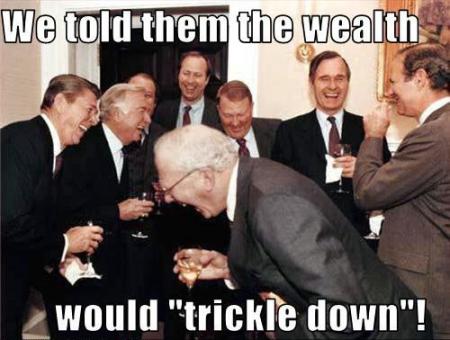
Photo: miamiautonomyandsolidarity
Open Letter to Mark Carney, Governor of the Bank of England
Corruption, Corruption,... Corruption, Everywhere
Values, Ethics, and the Common Good in MBA rankings: Where are they?
Our grandparents were wiser about markets than today’s economists and regulators
Economists Stop teaching 'The World's Dumbest Idea'!
Gaian Economics: Economics in University: Teaching or Propaganda?
What is Economics? A pictorial look:
what is economics - Google Search
If you are not a "Recovered" or "Recovering" academic economist yet, but have been inspired by this Blog to begin your own journey of “Recovery”, I wish to offer you the following as you prepare for your journey:
In February 2012 an international conference: "Economics education after the crisis: Are the graduate economists fit for purpose?" was organised by the UK Government Economic Service, the Bank of England and Royal Economic Society.
In her conference report, Diane Coyle (Chair) - Enlightenment Economics and ESRC Research Committee Member notes the following:
"One of the consequences of the financial and economic crisis since 2008 has been a re-evaluation of economics itself by at least some of its practitioners. This includes looking again at the teaching of economics in universities, the subject of a recent conference supported by the Government Economic Service, the Bank of England and the Royal Economic Society. As a speaker in the opening session of the conference noted ‘The crisis was a large intellectual failure. We all got it largely wrong and have been using the wrong intellectual apparatus.’
The question of whether the teaching of economics in universities needs reform is linked to the underlying question about the intellectual status of economics itself, post-crisis. A number of speakers noted that there had been huge progress in recent decades in some areas of economics, such as auction theory, or development economics, for instance. However, there was a degree of consensus among participants that economists need to acknowledge the limitations of what has been the standard paradigm in the subject for 50 years. Ideally, we now need to combine a greater modesty about the state of knowledge, an insistence on dogged empirical work to the highest scientific standards, and a new eclecticism about what explanation is needed to understand economic phenomena."…
Read the full report:
Teaching Economics After the Crisis
BBC Radio 4 - Teaching Economics After the Crash
One outcome of the Conference was the formation of a steering group, including both academics and employers of graduate economists, to discuss recommendations for reforms to the teaching of economics students in the UK, In this article, Diane summarises the issues discussed and sets out the group's recommendations. I very much recommend this as a very good starting point to all those wishing to begin their "Recovery" journey:
And then in 2012 a selection of papers presented at the conference was published in a very highly recommended book: “What’s the Use of Economics? Teaching the Dismal Science after the Crisis”, Edited by Diane Coyle, London Publishing Partnership, September 2012
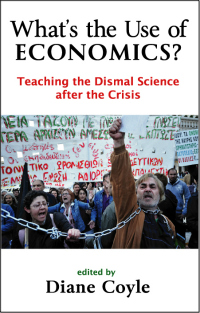
“With the financial crisis continuing after five years, people are questioning why economics failed either to send an adequate early warning ahead of the crisis or to resolve it quickly. The gap between important real-world problems and the workhorse mathematical model-based economics being taught to students has become a chasm. Students continue to be taught as if not much has changed since the crisis, as there is no consensus about how to change the curriculum. Meanwhile, employer discontent with the knowledge and skills of their graduate economist recruits has been growing. This book examines what economists need to bring to their jobs, and the way in which education in universities could be improved to fit graduates better for the real world. It is based on an international conference in February 2012, sponsored by the UK Government Economic Service and the Bank of England, which brought employers and academics together. Three themes emerged: the narrow range of skills and knowledge demonstrated by graduates; the need for reform of the content of the courses they are taught; and the barriers to curriculum reform. While some issues remain unresolved, there was strong agreement on such key issues as the strengthening of economic history, the teaching of inductive as well as deductive reasoning, critical evaluation and communication skills, and a better alignment of lecturers' incentives with the needs of their students.”
Read more: What’s the Use of Economics? Teaching the Dismal Science after the Crisis
Why Economics, Economists and Economy Fail?
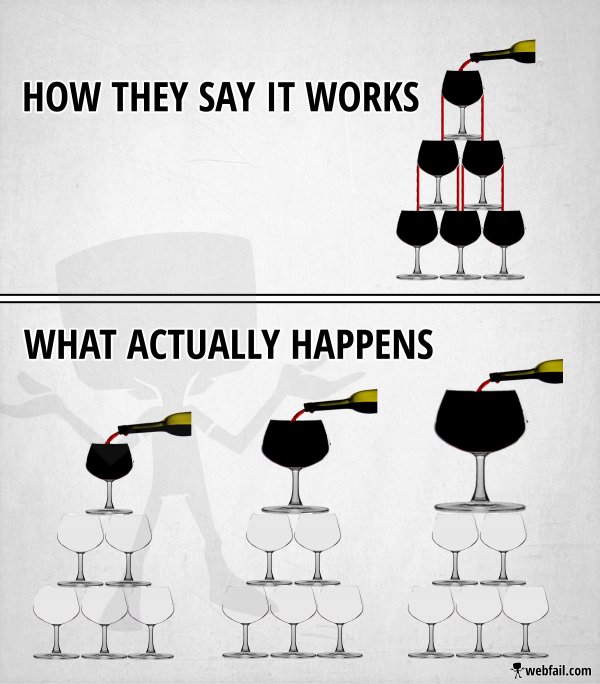
To all those imagining a real economics, a wise economist and a just economy: Why Economists Fail?
Why Economics, Economists and Economy Fail?
Values to Build a Better World
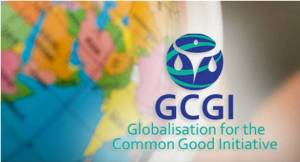
‘We have to build a better man before we can build a better society.’-Paul Tillich
‘Try not to become a man of success, but a man of value.’ - Albert Einstein
Values: To guard the hope, faith, love, courage, integrity, honesty, peace, justice, ecology, responsible leadership and humanity for the common good that can lead us forward, because they are the foundation for our greatest thoughts, actions, and the hope for our individual/collective sustainability and can never be cast asunder.
Values to Build a Better World
‘Saving economics from the economists’
ECON 101
A suggested first year module for all students majoring in economics
Ubuntu Economics: Economics for Meaning, Social Justice and the Common Good- Where we connect our intellect with our humanity
Prof. Kamran Mofid
Ronald Coase, professor of economics at the University of Chicago Law School and winner of the Nobel Prize in Economics, shortly before his death on September 2, 2013, published an article in the Harvard Business Review, ‘Saving economics from the economists’ (Coase & Wang, 2012). He argued that ‘the degree to which economics is isolated from the ordinary business of life is extraordinary and unfortunate’. ‘In the 20th century, economics identified itself as a theoretical approach of economization and gave up the real-world economy as its subject matter. It thus is not a tool the public turns to for enlightenment about how the economy operates…. It is time to reengage with the economy. Market economies springing up in China, India, Africa, and elsewhere herald unprecedented opportunities for economists to study how the market economy gains its resilience in societies with cultural, institutional, and organizational diversity. But knowledge will come only if economics can be reoriented to the study of man as he is and the economic system as it actually exists’.
There are many heterodox economists who reject the dominant model of rational choice in ‘free’ markets, and want to reconnect the study of the economy to the real world; to make its findings more accessible to the public; and to place economic analysis within a framework that embraces humanity as a whole, the world we live in.
This course, “Ubuntu Economics: Economics for Meaning, Social Justice and the Common Good” with its ‘human economy’ approach shares all these priorities. We believe that economic investigation should be accompanied by research into subjects such as anthropology, psychology, philosophy, politics, ethics and spirituality, to give insight into our own mystery, as no economic theory or no economist can say who we are, where have we come from or where we are going. Humankind must be respected as the centre of creation and not relegated by more short term economic interests.
Reverting to Ubuntu Economics:
As it has been said, “Africa, the birthplace of the first human, may just hold the key to the survival of humanity. How fitting and appropriate that the country where homo erectus was first identified is also the birthplace of the philosophy that points the way toward a sustainable future for us, its offspring.
No, I'm not talking about a new technology that will solve our dependence on non-renewable energy resources or that will stop climate change. Not directly at least. But I am talking about a way of seeing the world and all its inhabitants that, if adopted by a critical mass of human beings, would have a major impact in our ability to work together and ultimately shift the context of what it means to be a human being living on Planet Earth in the 21st century.
The philosophy is simple enough. It does however require a massive shift in how we think about ourselves, how we see each other, and how we view every other living thing on the planet.
I'm talking about the philosophy called "Ubuntu," which translated means "I am what I am, because of who we all are." The word "ubuntu" has its origins in the Bantu languages of southern Africa.”
In all, when we speak about the Ubuntu Spirit, we’re referring to the spirit of oneness, unity, love, peace and compassion, which expresses itself in a desire to help others and includes everyone. As Nelson Mandela explains, “The spirit of ubuntu – that profound African sense that we are human only through the humanity of other human beings – is not a parochial phenomenon, but has added globally to our common search for a better world.”
Moreover, as it has been observed by many, people are not individuals, living in a state of independence. They are part of a community, living in relationships and interdependence. This is in stark contrast to neo-classicals who emphasise the individual and its egoism as the engine of economics and business.
Course outline:
What is Ubuntu?
Ubuntu: The philosophical, theological, and spiritual underpinnings
Ubuntu: The economic values. How do they differ from the neo-classical values?
Ubuntu in Africa
What can the West learn from African spirituality and ubuntu?
Ubuntu’s role in community cohesion and transformation
Ubuntu’s role in health-care provision and allocation of resources
Ubuntu business: What is it?
Examples of ubuntu transforming the CEOs and their businesses
The spirit of ubuntu and philanthropy
Ubuntu and the Bottom Line
What does Ubuntu tell us about?
Empathy, cooperation, and sharing over retribution and competition, and inclusivity over exclusivity
Read more:
Ubuntu Education: Nelson Mandela’s Lasting Legacy
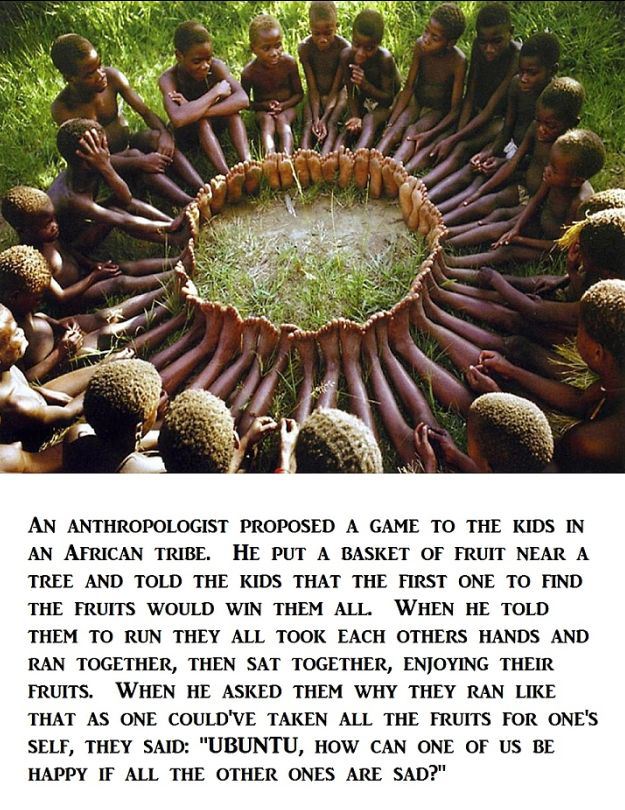
Photo: globalelite.tv
